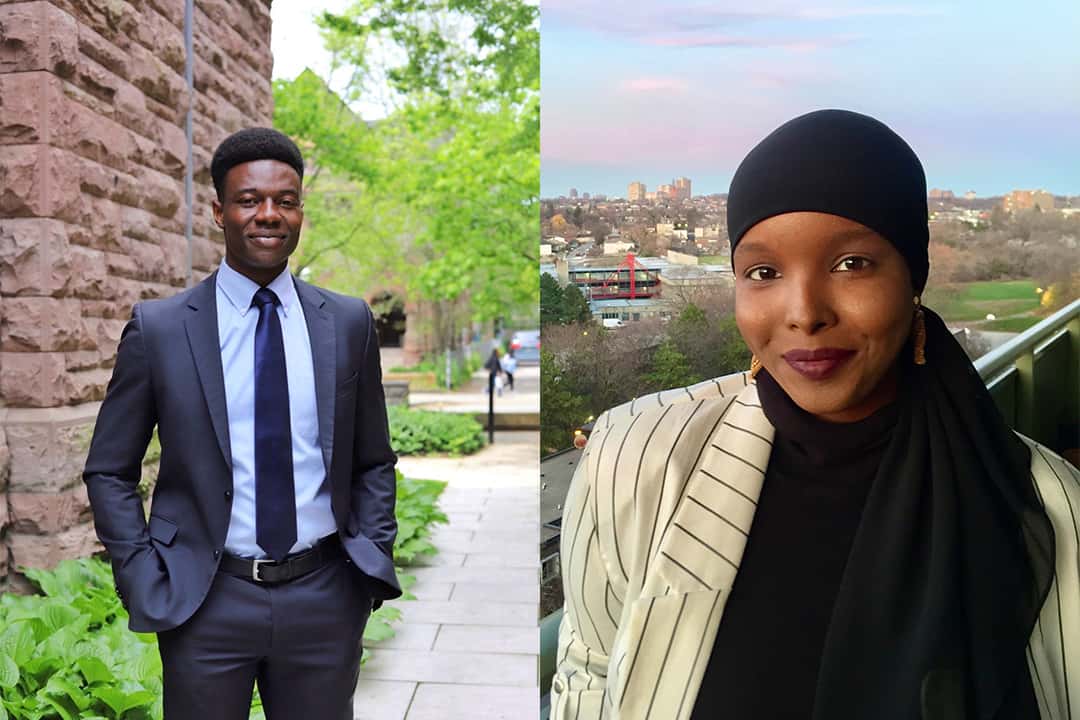This past November, the 2021 Rhodes scholars were announced, with U of T student Ikran Jama and alum Jeffrey Fasegha among their ranks.
The Rhodes Scholarship is one of the oldest international scholarship programs, providing an opportunity for students to pursue postgraduate studies at Oxford University, one of the most prestigious universities in the world.
Students have to go through a rigorous process, which starts with an internal application at their university. They are then endorsed by their university, and the winners are selected from a pool of finalists in an interview with a selection committee.
Jama and Fasegha will join nine other Canadians next year to continue their studies at the University of Oxford in the United Kingdom.
Experiences at U of T
Jama, a fourth-year student at U of T studying international relations and criminology, and the president of the Arts and Science Students’ Union (ASSU), said in an interview with The Varsity that she was in her room when she got the phone call with the news. “Immediately, I told my family because they could tell I got good news,” she said. “Everyone started to cry. It was incredible. It was overwhelming.”
Jama has come a long way since her first year at U of T, when she had feelings of imposter syndrome. “I wasn’t sure of how things would go in my first year just because I look different from my peers, or I felt like I wasn’t capable enough… or I wasn’t smart enough,” she said.
That is why she got involved with the ASSU: to ensure that other students who felt like her would have a voice and that she could advocate for their issues with the community she found at the ASSU.
Fasegha graduated in June 2020 after studying finance and economics at Rotman Commerce. During his time at U of T, he co-founded the award-winning Black Rotman Commerce (BRC), an organization that provides professional, academic, and social support to students with the goal of advancing Black representation in the finance industry.
“When I came to U of T, I was shocked at how few Black students there were,” said Fasegha. Fasegha participated in school outreach with the Black Students’ Association, which made him realize that a lot of Black students weren’t considering U of T as an option because they didn’t feel like it was a welcoming place for Black students. That is when he decided to found the BRC.
“We’re pretty disparate in our program,” Fasegha said. “For example, I was the only Black person in most of my classes. So having a community where you’re able to see other people who are going through similar struggles as you was definitely helpful.”
Giving back to the community
Both Jama and Fasegha are passionate about creating change and helping to better their communities, whether through Jama’s advocacy as president of the ASSU, where she has helped enact policies including extensions for credit/no credit deadlines, or Fasegha’s leadership at BRC, where he has helped organize the annual Black Career Conference, helping Black students find networking opportunities and learn more about career options from industry professionals.
Jama is also involved in the Somali community, mentoring Somali high school students. Somali students and low-income students may have more difficulty succeeding in school, as they face barriers like underfunded schools, Jama explained. “We need people who look like me to actually move forward, pursue postsecondary studies, and try to do incredible things in the world.”
They don’t plan on slowing down anytime soon. Jama intends to get a master’s degree in criminology and criminal justice at Oxford, with hopes of becoming an attorney and providing legal support and justice to her community and communities like hers. Fasegha is pursuing a master’s degree in African studies and public policy, with hopes of using innovation and entrepreneurship as tools for social and economic development in his community in Nigeria.
“If you see a problem, you should try to do what you can to fix it,” said Fasegha. “I encourage people not to discount [themselves]. You can do a lot more than you might imagine.”
Jama agrees with that sentiment. “You might not see things happening at the moment, but years from now, months from now, days from now, you never know. Just don’t give up on yourself.”


